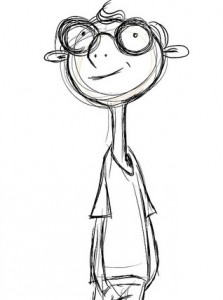Asperger’s Doesn’t Make You an Asshole

It’s all too easy to blame the world’s problems on those who are considered to have inferior social skills. Nerds and geeks are often stereotyped as being dorks, and, more often than not, for good reason. Many of us who were intellectuals, scientifically-inclined, bookish, obsessive about our hobbies, and/or just different from others were stigmatized and isolated from our peers in childhood and adolescence. It stands to reason that many of us would be late bloomers and perhaps not as well-versed in social norms as others.
Stereotypes of people who fall on the autism spectrum include many of the “dorky” tendencies that are ascribed to neurotypical nerds and geeks: an inability to pick up on social cues and an assumed lack of empathy. Whether conflating a lack of social skills with being on the autism spectrum or not, the argument generally leads to a shrug and a “too bad they can’t get it, ignore the poor things.”
It is untrue that social stigmatization is some magic spell that turns the outcast into a complete jerk. A lack of social acceptance can just as easily — and far more commonly — leads to self-feeding shyness, fear, and self-hatred. For every school shooting or otherwise violent action undertaken by a so-called “loser” (and please, for the love of Sagan, don’t include Columbine in that count), there are thousands of other social rejects who turn the violence in on themselves. Suicide, depression, and general unhappiness pervades the life of the vast majority ostracized people, not arrogance and aggression.
It then follows that most people who lack acceptance seek it out. In my limited, anecdotal experience, this leans more in the direction of putting up with terrible behavior in the hopes of being accepted, not acting like a jerk. Human beings, generally speaking, need social interaction to feel mentally healthy, and the desperation that can stem from lacking social interaction often leads to putting up with bad behavior from friends, not behaving badly towards friends. Why would anyone who craves acceptance alienate those who might potentially give them what they want? It simply doesn’t add up.
Specifically regarding autism, simply put, autism does not preclude empathy. Indeed, some studies have suggested the opposite, i.e. that those with autism shut down their empathy response because of over-, not under-, stimulation. Even if you don’t buy that idea, much of what is perceived as a lack of empathy in those on the spectrum is often just a misunderstanding based on social cues.
Of course, with both the socially inexperienced and those on the spectrum, a lack of comprehension or misinterpretation of social cues can easily lead to misunderstandings. However, that potential for the “awkward” or autistic person to commit a faux pas and/or miss a cue cannot account for anything beyond some minor interpersonal or group issues. One cannot reasonably blame a dedicated campaign of vitriol and hatred on social awkwardness or autism.
Why does all of this matter? All too often, the real problems of sexism, racism, ableism, cissexism, transphobia, and the like among skeptics and atheists are ascribed to “neck-beards,” “social awkwardness,” or “Asperger’s.” This is not only false because it confuses the neuroatypical with a lack of social skills and vice versa, but because assholery is far from exclusive to those who process information differently from others or those who lack friends. The people who actively oppose social justice in the movement are often brazen community leaders with nothing to blame but a sense of entitlement and a hatred of anyone who questions their privilege and preferences.
It’s both convenient and comforting, in a sinister way, to blame something like autism or social awkwardness for deep-rooted and pervasive problems. As with blaming sexism on sexual attraction or sense of humor, however, this is a dangerous glossing-over of real issues.
Most of the people on the Spectrum whom I’ve met in the skeptical community are committed to social justice. It is possible that there are some neuroatypical types on the other side, but to blame autism for chauvinism is just plain ignorant.
Note: For an alternative to Autism Speaks, i.e. the most disingenuously-named group ever, check out Autistic Self-Advocacy Network.









Heina,
Thanks for posting this here. It may help clear up a lot of misunderstandings about the subject of autism and autistic people.
A weird variant I’ve seen of this is where certain people try to excuse their assholery because… they’re assholes. As in (and I’ve heard this not just on the internet, but in person): “[Sexist/racist/homophobic/whatever crap]. Oh, don’t mind me, you can’t take anything I say seriously, I’m just and asshole.” As though that somehow makes it okay. “Hey, don’t mind me robbing your house, I’m just a thief.” In fact, it makes it worse because they can’t even plead ignorance, they obviously realize that they’re saying terrible things and just don’t care.
I expect there may even be some sort of near delusional team association idiocy going on for some guys. Staying put on an idea does maintain ones narrative making it easier to stay on the asshole team; when changing sides would require being more rational, thoughtful, and even admitting you were wrong.
I knew someone like this. Whenever I’d get irritated with something he was saying his response would be “Wait, are you taking what I say seriously?”, claim that he was an asshole, and that I should never take anything he says seriously.
Thank you so very much for this. My husband has Aspergers and yes, he is awkward, but generally it exhibits itself as extreme shyness. On the other hand he’s probably one of the kindest and most compassionate people that I know. If you mention that your dishwasher isn’t working while we’re over for dinner, he’ll probably try to take it apart and fix it for you. Which is in its own way kind of strange, but still at its core kind.
For heaven’s sake, he’s not stupid. He understands sexism and the politics that go along with it. Sure, he occasionally doesn’t get it at first, but I really think that usually comes from his being socialized male versus Aspergers.
THANK YOU. As a person with Asperger’s who has worked very hard to adapt to complex social situations (and with others to share and improve their skills), it is incredibly frustrating when people either dismiss us as “unfeeling” or grab the label to excuse their thuggish behavior.
Aspergers doesn’t make you an asshole – and it also doesn’t stop you from being one. Some people are assholes, regardless of what other medical conditions they may have.
My question has always been how these people reconcile the “socially awkward/Aspergers” thing with the “aggressively asking for sex from any and every attractive stranger” part.
Thanks for this.
“A lack of social acceptance can just as easily — and far more commonly — leads to self-feeding shyness, fear, and self-hatred.”
“Why would anyone who craves acceptance alienate those who might potentially give them what they want?”
Thank you so much for writing this. Much has been written elsewhere recently that demonizes those who make other people “feel uncomfortable,” and it’s good to know that someone understands how it feels coming from the other direction.
Thanks a lot for this! The problem you describe is somewhat related to the phrase that is often used in this community: “Anyone who believes in [insert belief system] must be mentally ill!”
I have a friend who has a mental illness, and she happens to be one of the most rational and skeptical people I’ve ever met. I know that it makes her furious that we very often equate mental illness with being irrational.
We really should think about these things more carefully.
Thank you. I’m an uncle of two wonderful kids with ASD, with varying severity. I’m always baffled how “Aspberger’s” gets mixed up with “jerk,” either by people trying to excuse themselves or by people trying to find a way to pity assholes.
Aspberger’s is completely orthogonal to social justice or being a jerk.
IME, a woman on the austism spectrum can easily be perceived as an asshole because she misses social cues or fails to provide them. The whole “respond politely to men who demand random shit” response can be particularly difficult to learn, and understanding just how much/little bodily autonomy you’re supposed to have at various times (and responding “appropriately” when you don’t get it) is basically black magic. There’s no rules, and not even much structure to who gets to do what to whom and when. I’ve been trapped trying to explain some of this to teenage girls at an autism support event and I really wish someone else had got sucked into that little trap.
One thing I have learned (the hard way) is that some questions are considered intimate, and specifically that answering them (or asking them) usually has a social context of “I am interested in having sex with you”. Some aspie guys can do the “innocent curiosity” thing much too well for their own good.
Thanks for (another) provocative and useful article, Heina.
I know that feel, as the kids say these days. I’ve both under- and over- interpreted things that men have said to me in terms of how sexual they were being. My neuroatypical brain, in addition to my repressed upbringing, made navigating sexuality and flirting in mainstream society all too difficult.
I’m happy that I now run with a really geeky crowd. Most of the people in it are happy to be upfront with me and explain things to me, and I try to return the favor after learning many a hard lesson myself.
“A lack of social acceptance can just as easily — and far more commonly — leads to self-feeding shyness, fear, and self-hatred.”
Thank you.
I’m not on the autism spectrum (at least, not that I’m aware of) but I do suffer from crippling social anxiety; I can’t get a job because I would have to _apply_ for it, which means approaching a stranger with a request.
Seeing people blame horrifying harassment on ‘socially awkward’ people pisses me off to no end. If I, somehow, managed to work up the courage to approach a woman I was interested in, I would be ridiculously polite about it and I wouldn’t even _think_ of immediately propositioning her for sex. And when she expressed disinterest, I would be hugely embarrassed and go away. Preferably to the next country.
Just how the fuck do these people think they can blame people like ME for the endless harassment? Oh, that’s right: we’re different. Creepy. Other.
This is exactly right. Anyone who behaves differently is branded as “other” and is then by default is “creepy”. I explain how this can then lead to xenophobia.
http://daedalus2u.blogspot.com/2010/03/physiology-behind-xenophobia.html
This mechanism is especially problematic for people with ASDs because they don’t have the neural structures to instantiate the social behaviors that NTs expect. It is like what Louis Armstrong said:
“If ya ain’t got it in ya, ya can’t blow it out”
If you don’t have the neuroanatomy to run social behaviors “native”, then you have to emulate them after you have learned what they are; but that makes them slow and clunky and error-prone.
Sorry, but that is the best that we can do.
Great article…my son has autism and I get frustrated by all of the lack of understanding that comes with people blaming being an asshole on autism…from my experience, it’s not the case at all (and after seeing much of myself in him, am starting to understand some of my own weirdness ;)
Another autism resource that does good work would be http://www.autismsciencefoundation.org/ which focuses on actual science. The Bad Astronomer has recommended them multiple times as well.
I think there is a contributing factor that hasn’t mentioned yet. For a while it seemed relatively common for people online to claim to have Aspergers syndrome although they hadn’t been diagnosed by a medical professional, because they just knew because they’d read about it, or their therapist said they probably have it, or they’re an unacknowledged genius etc. Using this “self-diagnosed aspergers” as an excuse for negative behaviors and personality traits is an unfortunate behavior that I can remember seeing on newsgroups back as the late 90s. It doesn’t seem to be as common nowadays but the damage is done.
Many of the “Why are loners/nerds/ASD/shy/etc people often seen as assholes/creeps/chauvinists/rude/etc?” questions become an interesting statement when you flip the sentence around. It may that people with Autism Spectrum are seen as assholes due in part to assholes proclaiming themselves as having Aspergers syndrome. It created a false stereotype that is endemic on the internet, and probably off of it now as well.
That’s probably not the root of the problem, but I’d bet that it’s a contributing factor. And apparently a character on “Glee” is portraying this (blaming their negative behavior on self-diagnosed Aspergers), which is probably helping spread the stereotype outside the internet because a disappointing percentage of the public seems unable to differentiate between “self-diagnosed” and “diagnosed”.
I feel bad for bringing it up, but it’s something to be considered if one hopes to change public perceptions… they may be perceiving something else entirely. [url=https://www.google.com/search?q=%22sure+I+have+aspergers%22]Creative[/url] [url=https://www.google.com/search?q=%22I+have+aspergers%22+%22formal+diagnosis%22]Google[/url] [url=https://www.google.com/search?q=%22I+have+aspergers%22+%22I+am+an+atheist%22]searches[/url] can help explain what I mean. Obviously some of those people have ASD and there’s no way of knowing exactly whom because laypersons cannot diagnose anybody based upon something they Googled on the internet, but [i]that’s part of the problem right there[/i].
Hearing Asperger’s get trotted out as an explanation for men being inconsiderate to women reminded me of something I read in high school, where a feminist was writing that, if autism were a “male brain” thing, therefore autistic people are chauvinists upholding the patriarchy*. Almost turned me off from feminism completely. I wonder how MRA’s would respond, learning that they share something in common some of the most extreme, least thought-provoking feminists, the difference being that MRA’s would consider patriarchy a good thing while denying it could possibly be a useful reality-based construct.
I will admit – though I am a longtime Skepchick reader, I braced myself when reading the title of this article. Usually, encountering the words “autism” and “asshole” in close proximity on the Internet means a heaping helping of stereotypes, neurotype-bashing, and plain, well, assholery. I had no close friends until junior high, and even then it was difficult to become too close since medical problems caused me to miss a lot of school. Although I was very isolated and faced chronic, often severe bullying up until high school, I didn’t lash out, nor did I self-harm (except for head banging, but that was self-stimulatory and not self-hating in origin). That is not to posture myself as superior to people with more severe depressions who self-harm, but it is to let people know that such people exist.
Many laymen don’t realize that in the neuro/psych communities, “empathy” has very specific meanings. There is the empathy A that means you care about others’ feelings (which most people think of), then there’s the empathy B that means you interpret what others are feeling based on reading their body language (the autism-relevant one ASD researchers use). Autistic people typically have normal-to-high empathy A and low empathy B. Sociopaths, who wouldn’t feel bad about shooting up a bunch of people unless they felt bad about how it affected them, generally have normal-to-high empathy B while lacking empathy A.
As someone on the spectrum who’s been very involved in social justice causes (primarily LGBT, disability, and women’s rights) mostly in high school and college, and I’ve had to take a break of a couple years because all the injustices (the small fraction I learned of and paid attention to on a regular basis) were really getting to me, as it’s all so very sad and frustrating and anger-provoking, with nowhere for that anger to go but verbally.
I don’t know whether it’ll pan out, but the idea of autistics having too much (type A, caring-type) empathy and then shutting out, resonates with my experience. When I did something bad and my parents scolded me (not even yelling), I felt so overwhelmingly awful for making them feel bad about my behavior that I would scream and cry, carrying on as if they’d hit me. That made them more upset (though I didn’t realize the reason at the time), since they thought I was trying to be manipulative, and let’s face it, parents as a rule don’t enjoy seeing their kids upset, for both emotional and sensory reasons. When there was an argument, the negativity felt palpable, and I would mirror the attitude of the other person unknowingly (if they were angry, I’d get angry; if they were sad, I’d get sad, etc.)
*(While there is some valid and interesting science behind Baron-Cohen’s “extreme male brain” thing, the book he wrote contains so much lazy and offensive stereotyping coupled with baseless speculation that it left me extremely disappointed for the start of college – seriously, I’d never read anything about feminist theory or taken classes in gender studies before, but it’s bleeding obvious.)
After I came up with the title, I realized that people might misread both it and my intention. I hope that it wasn’t to upsetting for you and that the unintentional (honest) bait-and-switch worked as well as I had hoped when I realized it was there.
As for your experiences as a person on the Spectrum, I can say that I empathize. I went my whole life thinking all the wrong things about myself. Now that I know how I’m different from others, I can better cope with it.
Very good comment on Asperger’s and different types of empathy.
SBC’s male brain idea leaves much to be desired.
I and other Aspies I know will point out how unempathetic Neurotypicals are when claiming Aspies are unempathetic. The joke is on the neurotypicals, despite their understanding of social skills they tend to be far more lacking in empathy than those with Asperger’s Syndrome.
One of the things I never understood at school in Special Ed is why they wanted me to be like the other students who bullied me. Aspies rarely bully, unless they are convinced they have to as a survival mechanism against bully Neurotypicals. It says a lot about their lack of empathy that it seemed bullying was their language, and the only way to get across to them was to act like a bully. Maybe Aspies are seen as unempathetic because they don’t empathize with the need to hurt others to have a good time. Perhaps Aspies don’t get Neurotypical behavior as so much of it seems to go against basic moral principals. Maybe, us Aspies do feel like we’re trying to interact with wild savages when it comes to Neurotypicals. I’m sure our behavior seems strange to people who regularly behave in unempathetic ways. You know what the main complaint I get from neurotypicals, is that I care too much.
Perhaps Neurotypicals hate Aspies because we remind them how lacking in empathy they are. They must think if they hurt us by calling us uncaring we’ll go away. The fact is despite all the whining that claiming Aspies are superior to Neurotypicals is wrong, my experience has shown we are. We don’t regard people by their pack status as Neurotypicals do. We don’t go out of our way to hurt others. The only people we hurt are bullies, who play the victim and cry about how Aspies are all mean.
Aspies don’t lack empathy, Neurotypicals do.
@jackie rose – thanks for mentioning that. This also hooks into the whole Scott Aaronson/Amanda MArcotte thing. Or Gamergate – where ASD folk were piled into by journalists… basically the gaming press were punching down at their own paying audience.
And they had had enough.